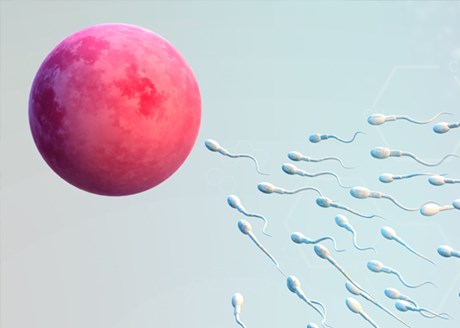The main sign of male infertility is the inability to conceive a child. In some cases, however, an underlying problem such as an inherited disorder, hormonal imbalance, dilated veins around the testicle, or a condition that blocks the passage of sperm may cause signs and symptoms. These can include problems with sexual function (difficulty in ejaculation and/or maintaining erection), pain and swelling in the testicle area, recurrent respiratory infections and decreased facial or body hair or other signs of chromosomal or hormonal abnormality.

Infertility in men
Signs of male infertility
Causes of male infertility
Some male infertility is caused by problems with semen production. Azoospermia is classed as a man having undetectable levels of sperm in his semen; it occurs in 1% of the male population. Other sperm problems include: abnormal sperm mobility (making it harder for the sperm to swim to the egg) and sperm morphology (meaning that sperm are shaped abnormally and cannot fertilise the egg).
There are also testicular problems which can lead to male infertility. For example, some men have undescended testicles, or testicles which have been affected by surgery, trauma, cancer or congenital defects. Sometimes the small tubes within the testicles are blocked so that the sperm do not make it into the ejaculate.
If there is a hormone imbalance or levels of testosterone are low, this can affect male fertility. Hormonal imbalances have a variety of causes such as drugs/medications, congenital disorders or tumours.
Some men suffer from ejaculation problems, such as premature ejaculation (when ejaculation occurs too quickly) and retrograde ejaculation (when semen is ejaculated into the bladder).
What is classed as low sperm count?
A male has a low sperm count when there are less than 15 million sperm per millilitre of his semen and a very low sperm count when there is less than 1 million/ml of semen.
A sperm motility rate of less than 32% is also considered low, as is an abnormal morphology rate which is higher than 97%.
How can I naturally improve my sperm?
Testes produce new sperm every 2 to 3 months. This means that a man’s lifestyle in the preceding months has an impact on the quality of the sperm sample and fertility. By cutting out unhealthy aspects of lifestyle, it is possible to improve male fertility and the chances of conception.
The common lifestyle choices that affect the quality of sperm are:
- Obesity
- Smoking
- Excessive alcohol consumption
- Recreational drugs.
- Increased scrotal temperature
- High stress levels
Outside of the effect of age on fertility, men must understand the role played by lifestyle choices. Smoking, excessive alcohol intake, using recreational drugs, poor diet, a sedentary lifestyle and being overweight all have a bearing on sperm quality and quantity.
Male fertility tests
For men that are looking for fertility testing and diagnosis, you will need to have a Semen Analysis. This will give comprehensive information on your sperm quality and quantity.
These can be done by your GP, or if you are looking to have treatment with us, we will do one as part of your diagnosis in order to put together your personalised treatment plan.
Our Semen Analysis looks in detail at the density, morphology and motility of your sperm, and is carried out by our team of highly qualified embryologists.
Treatments for male infertility
When a couple has tried to increase sperm count naturally for a prolonged period of time and have been unable to fall pregnant, many seek out some fertility assistance.
Fortunately, ICSI is an excellent fertility treatment for couples where male factor infertility is the issue or there is a fertilisation problem.
If you would like to find out more about your sperm count, or enquire about fertility treatment for infertility, please get in touch with our friendly team.
Want more information about male fertility tests and treatments?
If you would like more information about male fertility test and treatments then you can speak to one of our experienced team now.
Call us 0333 240 7300

